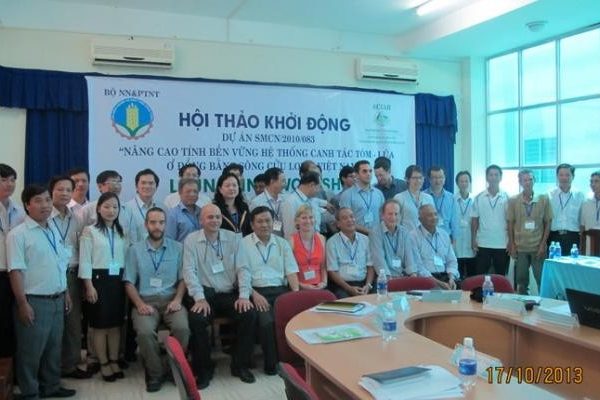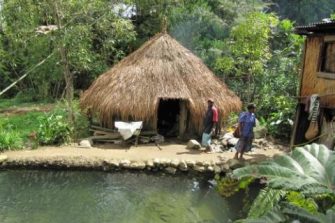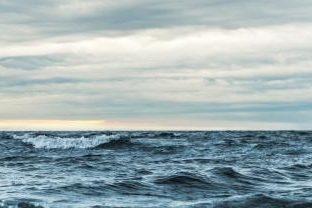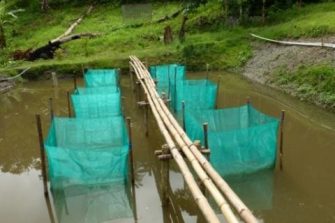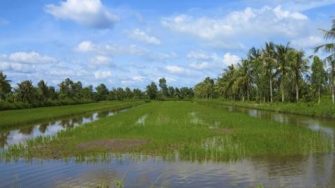
Project leader: A/Professor Jes Sammut, UNSW
Project coordinator (Vietnam): Dr Nguyen van Hao
Project summary:
Rice and shrimp have been farmed in rotation in the Mekong Delta for 40 years. Rice is farmed in the wet season when water salinity is low. Shrimp is farmed extensively and semi-intensively during the dry season when water salinity is too high to continue with rice production. Rice farming is promoted by the Government of Vietnam to ensure demand for rice is met locally and to maintain an export market. Rice production is also considered to be an important component of the sustainability of the rice–shrimp system. Increasing salinity, as a result of changing environmental conditions and catchment-wide water management, has led to rice crop losses and reduced yields in the normally productive wet season. Shrimp yields have been affected by recurrent disease outbreaks exacerbated by stocking of poor-quality post-larvae and declining pond soil and water quality. Research is already underway to test redesigned rice–shrimp farming systems and new salt-resistant rice varieties, but the mechanisms underpinning the sustainability of rice–shrimp production systems are poorly understood. Further research is required on key factors, mechanisms and constraints that influence the productivity of new rice–shrimp farming systems. The research will enable scientifically-validated modifications to the farming system to increase profitability and ensure sustainable practices are promoted.
Research questions, aims and objectives
The following research questions will be addressed:
- What are the limiting factors and problems for rice–shrimp farming? What are the beneficial effects of growing rice and shrimp together?
- Can the pond and canal designs and water management practices be improved? How can biotic interactions be improved?
- How can nutrients be managed in the system?
The overall aim of the project is to increase yields and profitability of rice–shrimp production systems, particularly of new designs, in the Mekong Delta and ensure these systems can adapt to environmental change and its effect on pond soil and water quality.
The specific research objectives are:
- To better understand the key components of the sustainability of rice–shrimp farming systems.
- To determine the sustainability of the rice–shrimp farming system by testing the identified key risk factors and system components.
- To determine, explain and quantify the benefits to productivity of integrating rice and shrimp farming.
- To identify and promote better management strategies to improve productivity and sustainability of rice–shrimp farming systems.
Planned outputs
A framework (Bayesian belief network; BBN) that captures the management and environmental factors that affect rice–shrimp productivity at different geographical scales
- Scientific knowledge on the benefits of rice–shrimp farming, constraints and opportunities for enhanced production, and management practices presented in research, technical and extension publications.
- Provision of information, through the Research Institute for Aquaculture No. 2 (RIA2) and partners, to inform policy and mechanisms for supporting the future of rice–shrimp farming. Transfer of findings to policymakers through workshops, meetings and publications.
- Formal training programs using the ‘train-the-trainer’ approach for staff of the Department of Agriculture Extension Stations (PAEC) and on-farm training of lead farmers and farmer groups. Findings will also be disseminated through the mass media. Knowledge on the opportunities for, and constraints to, collective farmer engagement and technology adoption.
Expected outcomes
- Adoption of sustainable rice–shrimp farming system and promulgation of the farming system through development programs and policy. A new Ministry of Agriculture and Rural Development (MARD) program will support rice–shrimp farming in the whole region based on project outputs.
- Identified knowledge gaps and the key parameters to improve economic and environmental outcomes.
- Improved research, technical and extension services through capacity building.
- Better informed farmers—better skills, knowledge and community cooperation.
Expected impacts
- Reliable crops and an increase in rice and shrimp yields and profitability.
- Improved income and food security.
- Reduction in on- and offsite environmental degradation.
Funding: 1,519,566 from ACIAR; Total from all sources: $4,420,733
List of personnel:
- A/Professor Jes Sammut, UNSW – Project Leader
- Dr Nguyen van Hao, RIA2 – Vietnam Project Coordinator, RIA2
- Professor Michele Burford, Griffith University – Collaborating Scientist
- Dr Jason Condon, Charles Sturt University – Collaborating Scientist
- Professor Le Quang Tri, Can Tho University – Collaborating Scientist
- Dr Cao Van Phung, CLRRI – Collaborating Scientist
Project Partners:
- The University of New South Wales: Commission Agency.
- Research Institute for Aquaculture 2 (RIA2), Ho Chi Minh City, Vietnam.
- Griffith University.
- Charles Sturt University.
- Can Tho University (CTU), Vietnam.
- Cuu Long Rice Research Institute (CLRRI), Vietnam.

